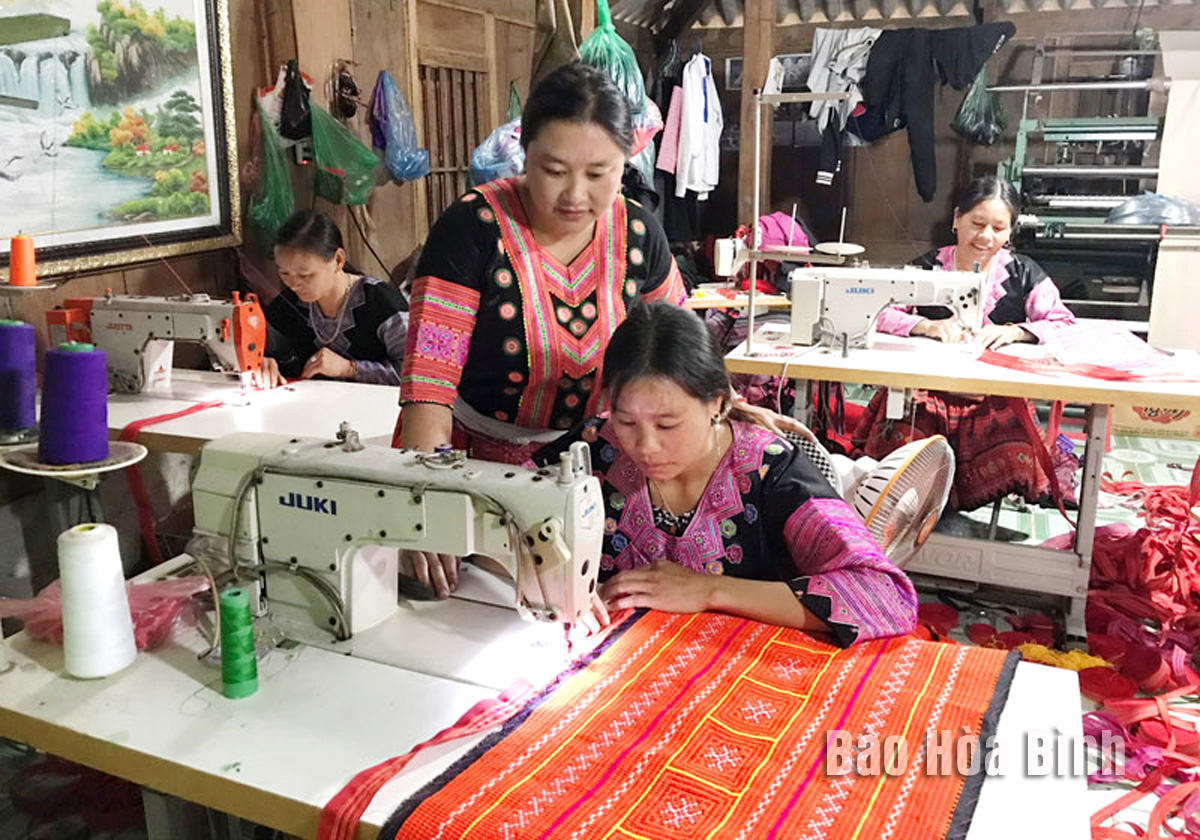
The implementation of the national target programme on new-style rural development for the 2021–2025 period in Hoa Binh has so far achieved significant progress, with 110 communes fulfilling Criterion No. 13 on production organisation and rural economic development, accounting for 85.3% of the province’s total.

Through linked production
and distribution chains, traditional brocade weaving products from Hang Kia and
Pa Co communes in Mai Chau district are sold well, raising local people's incomes.
Mai Chau district has excelled in meeting
Criterion No. 13, with its all 15 communes achieving the standard. This success
is partially attributed to local efforts to develop e-commerce systems, which
create favourable conditions for businesses, cooperatives, and producers to
join production-consumption linkages, facilitating goods circulation and
production. Related initiatives have initially led to the development of
websites and QR codes by businesses and cooperatives, financial support from
the district for those adopting scientific and technological advancements in
production and marketing, and the introduction of high-quality local products
to supermarket chains and e-commerce platforms.
Localities across the province are focusing on
implementing Criterion No. 13 and Component No. 3 of the national target
programme, with Hoa Binh further prioritising agricultural restructuring and
promoting the "One Commune, One Product" (OCOP) programme.
It is also an increasing number of local
economic models involving production and product consumption linkages.
According to the local rural development sub-department, these models have
optimised resource utilisation, improved economic efficiency, and boosted
incomes for local residents, while paving the way for sustainable agricultural
growth.
Currently, the province boasts 158 OCOP products
with 3-star and 4-star ratings. The diversification of distribution channels,
particularly the development of e-commerce, has met market demands, enabling
localities to expand production, enhance concentrated material zones, and
strengthen the agricultural sector. These efforts align with the broader goal
of agricultural restructuring.
In the time to come, the province plans to
intensify the harmonious implementation of production and rural economic
development solutions, aiming to meet and surpass the key targets set by the
national target programme.
According to data from the Hoa Binh Provincial Party Committee, the industrial production index for the first six months of 2025 is estimated to have increased by 20% compared to the same period last year. This marks the highest year-on-year growth rate for this period since 2020.
In the first six months of 2025, Hoa Binh province’s export turnover was estimated at 1.145 billion USD, marking an 18.11% increase compared to the same period in 2024. Import turnover was estimated at $ 804 million, a 17.15% increase, which helped the province maintain a positive trade balance.
The lives of the ethnic minority farmers in Tan Lac district have gradually improved thanks to the new directions in agricultural production. This is a testament to the collective strength fostered through the professional associations and groups implemented by various levels of the district’s Farmers’ Union.
With the motto the "product quality comes first,” after nearly one year of establishment and operation, Muong village’s Clean Food Agricultural and Commercial Cooperative, located in Cau Hamlet, Hung Son Commune (Kim Boi district), has launched reputable, high-quality agricultural products to the market that are well-received by consumers. The products such as Muong village’s pork sausage, salt-cured chicken, and salt-cured pork hocks have gradually carved out a place in the market and they are on the path to obtaining the OCOP certification.
In the past, the phrase "bumper harvest, rock-bottom prices" was a familiar refrain for Vietnamese farmers engaged in fragmented, small-scale agriculture. But today, a new spirit is emerging across rural areas of Hoa Binh province - one of collaboration, organisation, and collective economic models that provide a stable foundation for production.
Maintaining growing area codes and packing facility codes in accordance with regulations is a mandatory requirement for agricultural products to be eligible for export. Recently, the Department of Agriculture and Environment of Hoa Binh province has intensified technical supervision of designated farming areas and packing facilities to safeguard the "green passport" that enables its products to access international markets.



